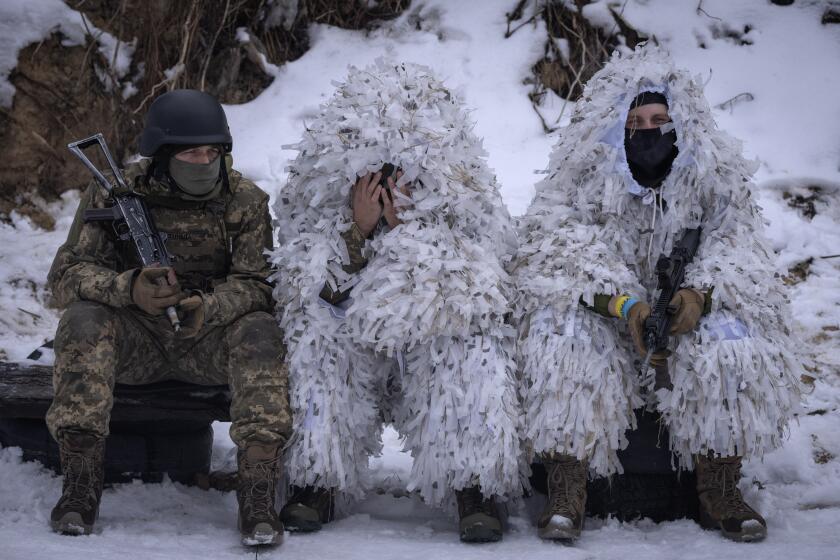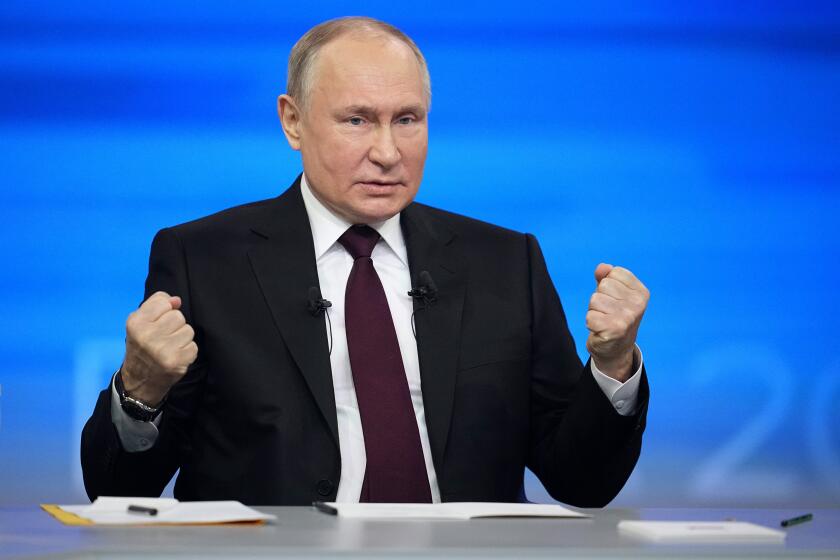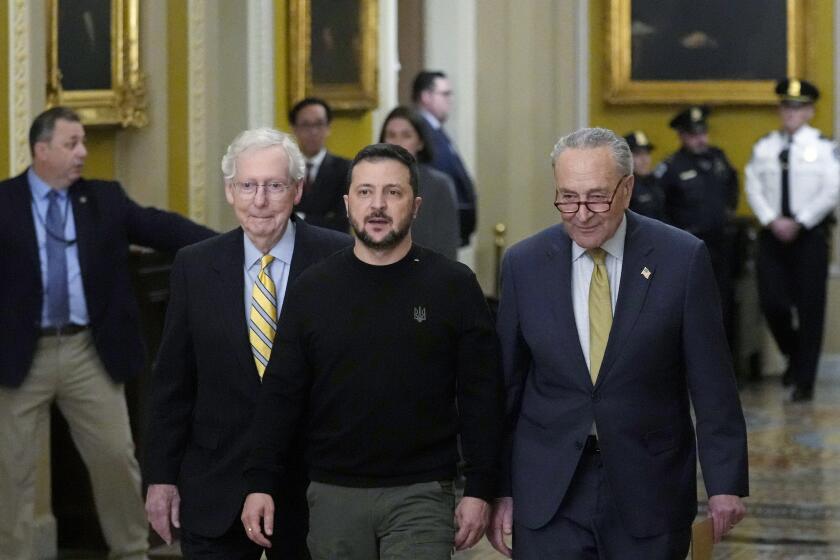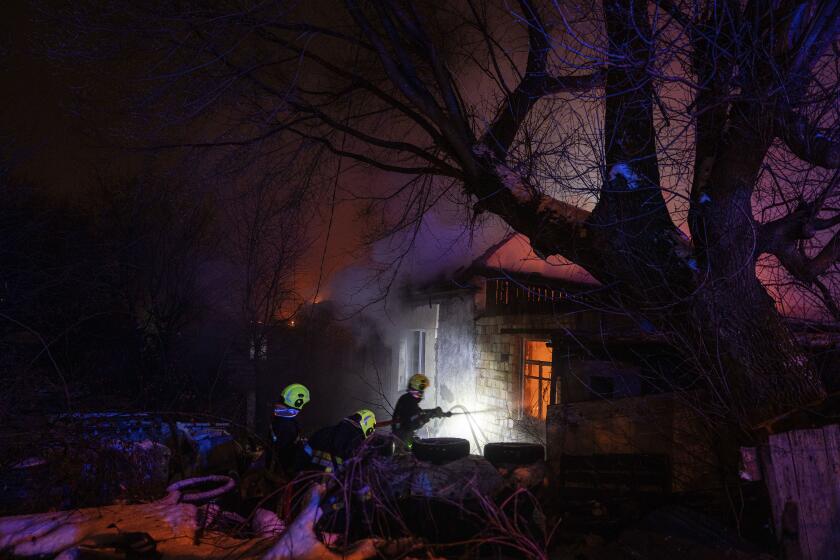Ukraine gets EU membership boost, but no new European aid, after setback in U.S.
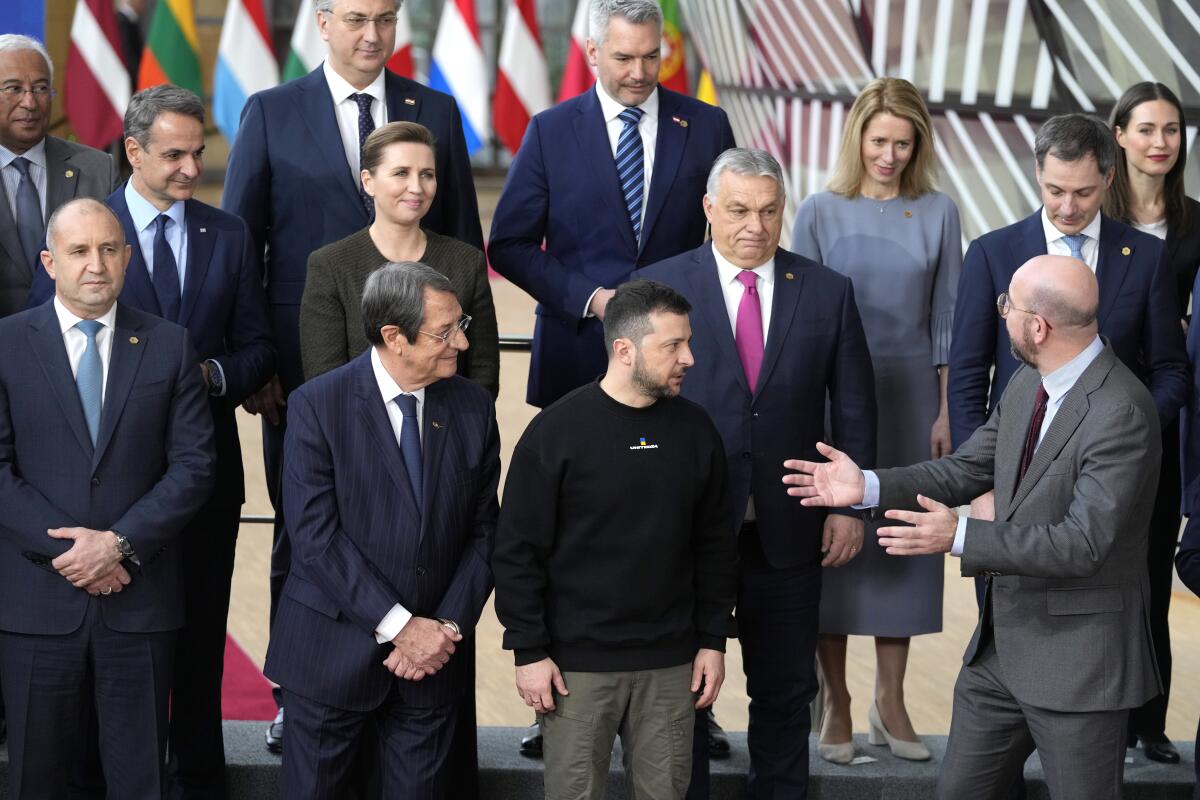
- Share via
BRUSSELS — The European Union failed to agree on a $54-billion aid package that Ukraine desperately needs to stay afloat, even as the bloc decided Thursday to open accession negotiations with the war-torn country.
The aid was vetoed by Hungarian Prime Minister Viktor Orban, delivering another tough blow to Ukrainian President Volodymyr Zelensky after he failed this week to persuade U.S. lawmakers to approve $61 billion more for Ukraine, mainly to buy weapons from the U.S.
The start of accession talks was a momentous moment and stunning reversal for a country at war that had struggled to find the backing for its membership aspirations and long faced obstinate opposition from Orban.
Hungary’s leader decided not to veto the accession talks, but then blocked the aid package.
“I can inform you that 26 leaders agreed on the [budget negotiation],” European Council President Charles Michel said. “I should be very precise. One leader, Sweden, needs to consult its parliament, which is in line with the usual procedure for this country, and one leader couldn’t agree.”
The decisions required unanimity among the EU’s members.
Still, Michel, who was chairing the Brussels summit, called the start of accession talks “a clear signal of hope for their people and our continent.”
The Siberian Battalion is an unusual unit of the Ukrainian military made up of Russian nationals who have joined to fight against their own homeland.
Although the process between opening negotiations and Ukraine finally becoming a member could take many years, Zelensky welcomed the agreement as “a victory for Ukraine. A victory for all of Europe.”
“History is made by those who don’t get tired of fighting for freedom,” Zelensky said.
The financial package could not be endorsed after Orban vetoed both the extra money and a review of the EU budget. Ukraine is badly counting on the funds to help its damaged economy survive in the coming year.
Michel said leaders would reconvene in January in an effort to break the deadlock.
Orban had warned before the summit that forcing a decision on the Ukraine issues could destroy EU unity. Decisions on enlarging the EU and on a review of its long-term budget, which contains the $54.1 billion in aid for the government in Kyiv, must be unanimous among all 27 member countries. Orban had also threatened to veto the start of accession talks but ultimately backpedaled.
Belgian Prime Minister Alexander De Croo called the opening of membership discussions a black eye for Russian President Vladimir Putin. “It is a very clear message to Moscow. Us Europeans, we don’t let go of Ukraine,” he said.
Russian President Vladimir Putin continues to vow that there will be no peace in Ukraine until his goals, which remain unchanged, are achieved.
Russian President Vladimir Putin’s KGB years in East Germany offer a window into his crackdown on protests, war on Ukraine and yearning for empire.
Orban said that his opposition remained steadfast, but that he decided not to use his veto because the 26 other nations were arguing so strongly in favor. Under EU rules, an abstention does not prevent a decision from being adopted.
“Hungary’s perspective is clear: Ukraine is not ready for us to begin negotiations on its EU membership. It’s a completely illogical, irrational and improper decision,” he said.
Others lauded Orban’s gesture. They had been preparing for the summit spilling over into an extra day Saturday.
“In fairness to Prime Minister Orban, he made his case, made it very strongly. He disagrees with this decision and he’s not changing his opinion in that sense, but essentially decided not to use the veto power,” Irish Prime Minister Leo Varadkar said.
Belgium’s De Croo had a slightly different take, saying he thought Orban “didn’t use his veto because he realized that it would be indefensible.”
At the same time as Ukraine, the EU leaders also decided to open membership negotiations with Ukraine’s neighbor Moldova.
Ukraine came under attack from the air and from cyberspace as projectiles rained down on a southern region and hackers knocked out cellphone service.
In the United States, national security advisor Jake Sullivan welcomed “the EU’s historic decision to open accession negotiations with Ukraine and Moldova, a crucial step toward fulfilling their Euro-Atlantic aspirations.”
In Kyiv, the news was met with cautious optimism.
“We are Europe. Ukraine is Europe, the center of Europe. I want us to be given the status of a proud member of Europe,” said Olha Paradovska, a 70-year-old Kyiv resident.
Ivan Olezhko, 19, said the decision to start accession talks was long overdue. “If everything goes well, I will be happy, but we don’t know what will happen next,” he said.
EU leaders had expected the summit to take at least until late Friday before any sort of breakthrough might be clinched, so the fateful announcement came totally unexpectedly after Orban did not block the move by his colleagues.
A beaming Michel came down in the summit media room unscheduled and said, “This is a historic moment, and it shows the credibility of the European Union. The strength of the European Union. The decision is made.”
He said the negotiations would open before a report will be made to the leaders in March.
Ukraine’s capital came under another ballistic missile attack that injured at least 53 people on the ground, including six children, officials said.
The surprise came at a dire time for Zelensky, straight off a trip this week to Washington where his pleas for more aid from the U.S. Congress fell on deaf ears. Ukraine’s president was looking for a better response in Brussels.
“It is just as important that Ukraine has the means to continue the war and rebuild its country,” De Croo said.
The urgency to find a solution is matched only by the potential blow to the EU’s credibility, the Ukrainian president said in a video address to the leaders assembled in Brussels.
“Nobody wants Europe to be seen as untrustworthy. Or as unable to take decisions it prepared itself,” he said.
Associated Press writers Vasilisa Stepanenko in Kyiv, Lorne Cook in Brussels and Justin Spike in Budapest contributed to this report.
More to Read
Sign up for Essential California
The most important California stories and recommendations in your inbox every morning.
You may occasionally receive promotional content from the Los Angeles Times.
